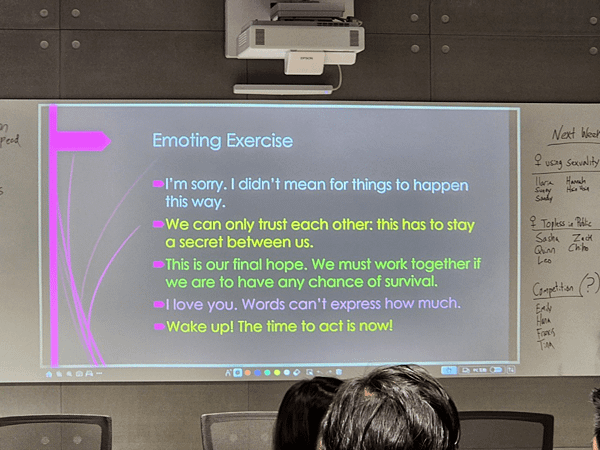today is talk about Strategies for Engaging Emotions
PARTA、Practice

To make the audience feel engaged and captivated, consider incorporating the following techniques:

(1) Spot weakness: Highlight weaknesses in arguments or situations to provoke critical thinking and reflection.
(2) Stories: Share compelling narratives that evoke emotions and connect with the audience on a personal level.
(3) Short, strong sentences: Use concise and impactful sentences to convey ideas effectively and leave a lasting impression.
(4) Create scenarios: Utilize metaphors, imagination, and hypothetical situations to stimulate the audience's thinking and involvement.
(5) Sarcasm: Employ sarcasm selectively to add a touch of wit and irony, creating an engaging and thought-provoking atmosphere.
(6) Joke/humor: Incorporate appropriate jokes or humor to lighten the mood and enhance audience enjoyment.
(7) Fear: Evoke fear or create a sense of urgency to grab the audience's attention and drive their emotional response.
(8) Share experiences: Relate personal experiences or real-life anecdotes that resonate with the audience, fostering relatability and engagement.
(9) Intimacy: Establish a sense of intimacy by speaking directly to the audience, using inclusive language, and maintaining eye contact.
(10) Empathy: Show empathy towards the audience's perspectives, concerns, and emotions, fostering a deeper connection.
(11) Exaggeration: Use exaggeration selectively to emphasize certain points or create a humorous effect, capturing the audience's attention and interest.
Part B、homework (for lecture)
These are questions what I prepare for next week
Question 1:
Mr. Verheyden, what core skills do you believe people aspiring to become diplomats in the 21st century should possess, such as language abilities, cross-cultural communication, or crisis management? Could you provide examples of your experiences in international settings where you utilized these skills?
Question 2:
When conducting diplomatic missions, how do you maintain your country's values and interests while respecting and understanding the position of other nations? How have you practiced this balance in challenging missions like those in Afghanistan or Taiwan?
Question 3:
In your diplomatic career, what cultural conflicts or misunderstandings have you encountered, and how did you resolve these issues? Could you share a specific case?
Question 4:
For students aspiring to pursue a career in diplomacy, what skills or knowledge do you recommend they cultivate during their academic years to better adapt to and address challenges in their future diplomatic work?
Question 5:
As technological advancements increasingly impact the field of diplomacy, how do you view the application of technology in diplomacy, such as social media or big data analysis? What potential effects do you think these technologies may have on future diplomatic policies or approaches?
Question 6:
Mr. Verheyden, what core skills do you believe people aspiring to become diplomats in the 21st century should possess, such as language abilities, cross-cultural communication, or crisis management? Could you provide examples of your experiences in international settings where you utilized these skills?
Question 7:
When conducting diplomatic missions, how do you maintain your country's values and interests while respecting and understanding the position of other nations? How have you practiced this balance in challenging missions like those in Afghanistan or Taiwan?
Question 8:
In your diplomatic career, what cultural conflicts or misunderstandings have you encountered, and how did you resolve these issues? Could you share a specific case?
Question9:
For students aspiring to pursue a career in diplomacy, what skills or knowledge do you recommend they cultivate during their academic years to better adapt to and address challenges in their future diplomatic work?
Question 10:
As technological advancements increasingly impact the field of diplomacy, how do you view the application of technology in diplomacy, such as social media or big data analysis? What potential effects do you think these technologies may have on future diplomatic policies or approaches?



 留言列表
留言列表